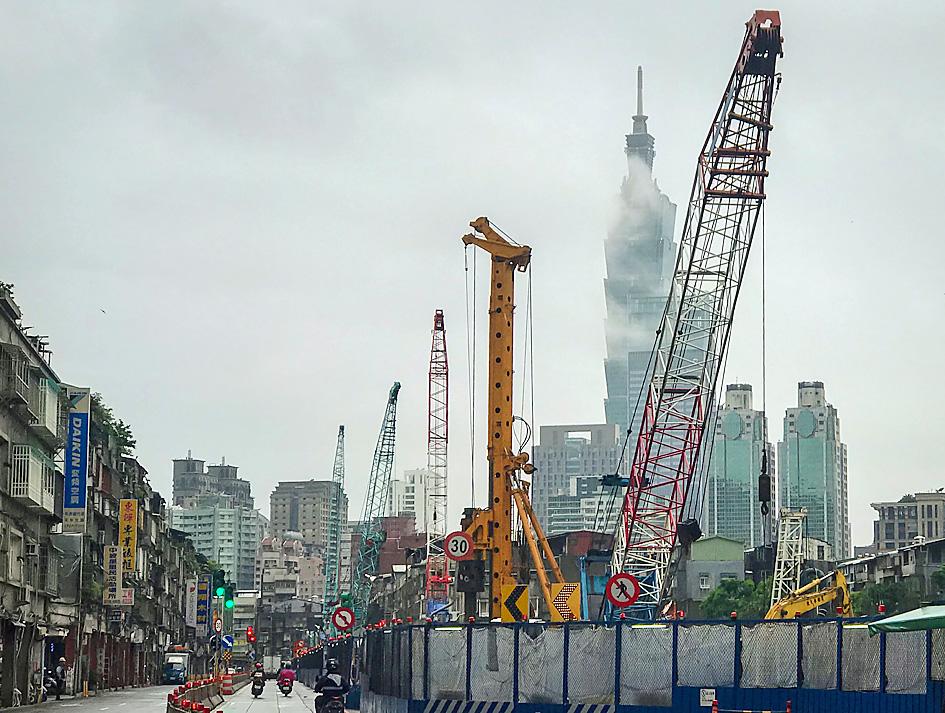The nation’s economy might grow just 1.67 percent this year squarely on the back of government expenditure and private investment, as exports and consumer spending have stalled, the Directorate-General of Budget, Accounting and Statistics (DGBAS) said yesterday.
The forecast is a sizeable retreat from an estimate of 2.37 percent growth made in February before the COVID-19 outbreaks became a pandemic.
“The previous forecast was guided by the SARS crisis in 2003 and therefore underestimated the ongoing pandemic, which is hitting economic activity hard at home and abroad,” DGBAS Minister Chu Tzer-ming (朱澤民) told a media briefing in Taipei.

Photo: CNA
The agency now expects exports and consumer spending to fall into the negative for the whole year, with declines of 0.7 percent and 0.12 percent, reversing projected growth of 2.85 percent and 1.58 percent respectively.
The downward revision came even though exports proved stronger in the first quarter, driven by strong demand for 5G deployment, as well as remote working and learning arrangements.
Economic activity remains tepid worldwide, although most countries have eased social distancing measures and launched aggressive stimulus programs, Chu said.
Major economies are set for a recession this year due to massive unemployment and diminished trade flows induced by shutdowns to contain the novel coronavirus, he said.
A collapse in crude oil prices has put extra pressure on goods trade, especially raw materials and base metals, which account for more than 20 percent of overall exports, he added.
A freeze in consumer spending has also made the GDP downgrade necessary, Chu said.
GDP last quarter contracted 1.58 percent, the first downturn since the 2008-2009 global financial crisis and deeper than the 1.14 percent retreat during the SARS outbreak in 2003, despite an 8.18 percent increase in new vehicle sales and a 12.39 percent increase in e-commerce sales, he said.
Altogether, the pandemic is expected to erase 2.1 percentage points from Taiwan’s GDP growth this year, he added.
The government has come to the rescue with infrastructure improvement measures and special budgets that could bolster the economy by 0.9 percentage points, Chu said.
The government and state-run enterprises would also contribute to capital formation that is projected to rise 1.02 percent this year, the agency said, up slightly from a 0.96 percent pickup it had previously predicted.
Private investment might grow only 2.31 percent this year, 0.79 percentage points less than previously forecast, as some firms are expected to wait until the virus crisis stabilizes, it added.

In Italy’s storied gold-making hubs, jewelers are reworking their designs to trim gold content as they race to blunt the effect of record prices and appeal to shoppers watching their budgets. Gold prices hit a record high on Thursday, surging near US$5,600 an ounce, more than double a year ago as geopolitical concerns and jitters over trade pushed investors toward the safe-haven asset. The rally is putting undue pressure on small artisans as they face mounting demands from customers, including international brands, to produce cheaper items, from signature pieces to wedding rings, according to interviews with four independent jewelers in Italy’s main

Japanese Prime Minister Sanae Takaichi has talked up the benefits of a weaker yen in a campaign speech, adopting a tone at odds with her finance ministry, which has refused to rule out any options to counter excessive foreign exchange volatility. Takaichi later softened her stance, saying she did not have a preference for the yen’s direction. “People say the weak yen is bad right now, but for export industries, it’s a major opportunity,” Takaichi said on Saturday at a rally for Liberal Democratic Party candidate Daishiro Yamagiwa in Kanagawa Prefecture ahead of a snap election on Sunday. “Whether it’s selling food or

CONCERNS: Tech companies investing in AI businesses that purchase their products have raised questions among investors that they are artificially propping up demand Nvidia Corp chief executive officer Jensen Huang (黃仁勳) on Saturday said that the company would be participating in OpenAI’s latest funding round, describing it as potentially “the largest investment we’ve ever made.” “We will invest a great deal of money,” Huang told reporters while visiting Taipei. “I believe in OpenAI. The work that they do is incredible. They’re one of the most consequential companies of our time.” Huang did not say exactly how much Nvidia might contribute, but described the investment as “huge.” “Let Sam announce how much he’s going to raise — it’s for him to decide,” Huang said, referring to OpenAI

The global server market is expected to grow 12.8 percent annually this year, with artificial intelligence (AI) servers projected to account for 16.5 percent, driven by continued investment in AI infrastructure by major cloud service providers (CSPs), market researcher TrendForce Corp (集邦科技) said yesterday. Global AI server shipments this year are expected to increase 28 percent year-on-year to more than 2.7 million units, driven by sustained demand from CSPs and government sovereign cloud projects, TrendForce analyst Frank Kung (龔明德) told the Taipei Times. Demand for GPU-based AI servers, including Nvidia Corp’s GB and Vera Rubin rack systems, is expected to remain high,